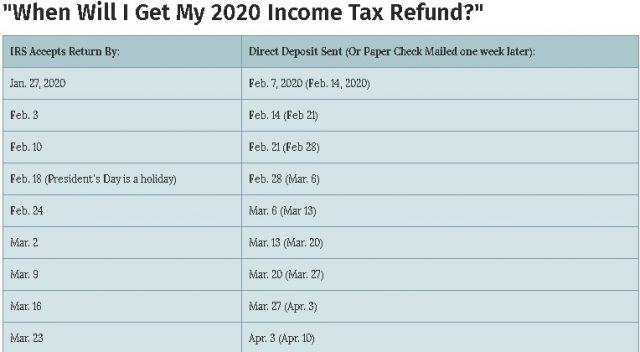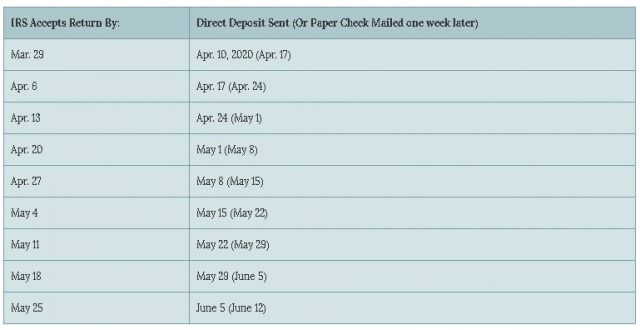
The 2020 income tax season officially started on Monday, January 27, when the IRS started accepting tax returns. Despite the stereotype of people hating doing their taxes, for millions of taxpayers, tax season means getting a refund. But there’s no reason to get a refund loan or similar services, which often include steep fees, since most taxpayers can get their 2020 income tax refund via direct deposit from the IRS in as little as 10-15 days if they file early.
The main factors that determine when a taxpayer may receive their return include:
- How early they file
- If the taxpayer is claiming certain credits (especially EITC and CTC)
- Whether the return is e-filed or sent by mail
- Whether the taxpayer has existing debts to the federal government
The IRS will once again delay processing by 2-3 weeks tax returns that claim the Earned Income Tax Credit (EITC) or Child Tax Credit (CTC), since these credits are the most abused. The additional time allows the IRS to verify that taxpayers qualify for the credits.
The below chart shows an estimated timeline for when a taxpayer is likely to receive their refund, based on the information we have now, and using projections based on previous years. If your IRS income tax refund is delayed, ask your tax professional, or simply use the “Where’s My Refund?” tool on the IRS website. Or download the IRS2Go app to check your refund status.
The below dates are only an estimate.

** = Returns with EITC or CTC may have refunds delayed until late February to verify credits.
*** = Filing during peak season can result in slightly longer waits.

Be Safe – Hire a Professional
Taxpayers who use a professional, such as a CPA or EA, can ask that professional for the estimated date of their tax refund, and they can be more confident that their taxes have been properly (and legally) filed.
There are also apps for Apple, Android and other devices that help track refund status.
Other Notes:
In general, the IRS says that returns with refunds are processed and payments issued within 21 days. For paper filers, this can take much longer, however. The IRS and tax professionals strongly encourage electronic filing.
What If You Can’t File Your Income Taxes By April 15?
Taxpayers who don’t have all of the paperwork needed in order to file their taxes can easily file an extension form, “Form 4868, Application for Automatic Extension of Time to File U.S. Individual Income Tax Return.” – This will give the taxpayer until October 15 to file their tax return. No reason or excuse is needed to receive this extension, and as the title states, it is automatically granted.
However, if a person will owe taxes, it is still their obligation to pay those taxes by April 15, even if they have requested an extension to file. A tax professional can assist with this. Those who are due a refund generally only need to file the extension request by April 15. Any tax professional and most do-it-yourself tax programs can perform this task.
























